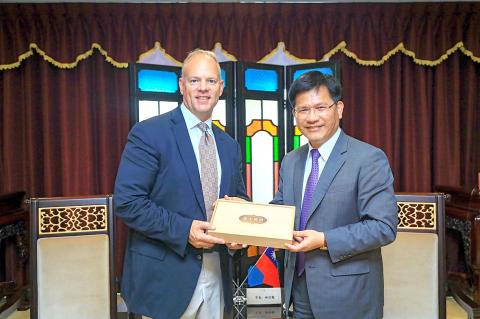A bill to encourage visits between the US and Taiwan at all levels was passed by the US House Committee on Foreign Affairs on Thursday.
The legislation now moves on to the floor of the House of Representatives.
The bill says that since the enactment of the Taiwan Relations Act in 1979, ties between the US and Taiwan have suffered from insufficient high-level communication due to the self-imposed restrictions that the US maintains on visits by high-ranking officials to Taiwan.

Photo: Huang Chung-shan, Taipei Times
“The United States government should encourage visits between the United States and Taiwan at all levels,” the bill says.
At present, senior US government officials rarely visit Taiwan because of Washington’s formal ties with China and a lack of official relations with Taipei.
When then-US Environmental Protection Agency administrator Gina McCarthy traveled to Taiwan in 2014, she was the first US Cabinet-level official to visit Taiwan in 14 years.
No other official of that level of seniority has visited since.
In a statement, committee chairman Ed Royce said the bill denounces the current practice of restricting official travel between the two sides and would serve to further strengthen the critical US-Taiwan partnership.
Before the Taiwan travel act can become law, it must be passed by both the House and the Senate, before being signed by US President Donald Trump.
In Taipei, Ministry of Foreign Affairs spokesman Andrew Lee (李憲章) yesterday said the ministry welcomed and thanked the Foreign Affairs Committee for passing the bill, which was proposed by US Representative Steve Chabot, one of the cochairs of the House Congressional Taiwan Caucus.
“The ministry believes the bill fully demonstrates [the US Congress’] support for mutual visits of senior officials from Taiwan and the US, and the advancement of US-Taiwan ties,” Lee said in a statement.
As a similar bill with the same title has been introduced in the US Senate by Republican Senator Marco Rubio, the ministry said it would be watching developments closely.
Additional reporting by Stacy Hsu

The CIA has a message for Chinese government officials worried about their place in Chinese President Xi Jinping’s (習近平) government: Come work with us. The agency released two Mandarin-language videos on social media on Thursday inviting disgruntled officials to contact the CIA. The recruitment videos posted on YouTube and X racked up more than 5 million views combined in their first day. The outreach comes as CIA Director John Ratcliffe has vowed to boost the agency’s use of intelligence from human sources and its focus on China, which has recently targeted US officials with its own espionage operations. The videos are “aimed at

STEADFAST FRIEND: The bills encourage increased Taiwan-US engagement and address China’s distortion of UN Resolution 2758 to isolate Taiwan internationally The Presidential Office yesterday thanked the US House of Representatives for unanimously passing two Taiwan-related bills highlighting its solid support for Taiwan’s democracy and global participation, and for deepening bilateral relations. One of the bills, the Taiwan Assurance Implementation Act, requires the US Department of State to periodically review its guidelines for engagement with Taiwan, and report to the US Congress on the guidelines and plans to lift self-imposed limitations on US-Taiwan engagement. The other bill is the Taiwan International Solidarity Act, which clarifies that UN Resolution 2758 does not address the issue of the representation of Taiwan or its people in

US Indo-Pacific Commander Admiral Samuel Paparo on Friday expressed concern over the rate at which China is diversifying its military exercises, the Financial Times (FT) reported on Saturday. “The rates of change on the depth and breadth of their exercises is the one non-linear effect that I’ve seen in the last year that wakes me up at night or keeps me up at night,” Paparo was quoted by FT as saying while attending the annual Sedona Forum at the McCain Institute in Arizona. Paparo also expressed concern over the speed with which China was expanding its military. While the US

SHIFT: Taiwan’s better-than-expected first-quarter GDP and signs of weakness in the US have driven global capital back to emerging markets, the central bank head said The central bank yesterday blamed market speculation for the steep rise in the local currency, and urged exporters and financial institutions to stay calm and stop panic sell-offs to avoid hurting their own profitability. The nation’s top monetary policymaker said that it would step in, if necessary, to maintain order and stability in the foreign exchange market. The remarks came as the NT dollar yesterday closed up NT$0.919 to NT$30.145 against the US dollar in Taipei trading, after rising as high as NT$29.59 in intraday trading. The local currency has surged 5.85 percent against the greenback over the past two sessions, central